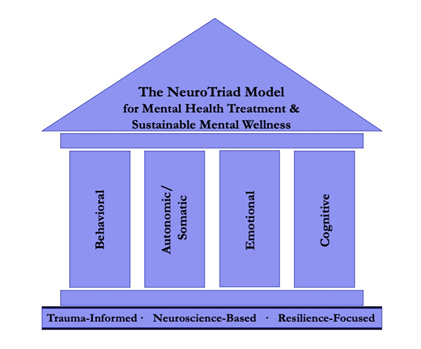Introducing the NeuroTriad Model
The foundational model of the Truitt Institute’s Educational Programming
Guiding Mental Health Treatment & Creating Sustainable Mental Wellness

The NeuroTriad Model:
An In-Depth Look at Holistic Brain Health and Wellness
The NeuroTriad Model is the cornerstone of the Truitt Institute’s philosophy towards achieving optimal brain health and wellness. This transformative approach incorporates three foundational elements that guide our treatment protocols and educational workshops:
- Trauma-informed Care: Recognizing the profound impact that traumatic experiences have on an individual’s overall wellbeing.
- Neuroscience-based Approach: Utilizing the latest research and discoveries in neuroscience to understand and enhance the brain’s capabilities.
- Resilience-focused Solutions: Emphasizing the development of resilience to navigate life’s challenges effectively.
The BASEC Pillars: A Multi-Faceted Framework
The NeuroTriad foundation gives rise to four critical pillars that are known as BASEC, an acronym for Behavioral, Autonomic/Somatic, Emotional, and Cognitive aspects. These pillars serve as guideposts for a comprehensive understanding of the human experience:
Behavioral Pillar
- Foundational Psychological Tenets: Incorporates evidence-based psychological theories that impact human behavior such as operant conditioning, social learning, and more.
- Integration and Interplay: Examines how behavior interacts with the autonomic, somatic, emotional, and cognitive dimensions of human experience.
- Pathology and Resilience: Evaluates behavioral aspects in the context of mental health disorders, as well as their role in resilience-building.
- Lifespan Brain Development: Investigates how behavioral patterns evolve and impact brain development throughout life.
Autonomic/Somatic Pillar
- Foundational Psychological Tenets: Addresses the role of the autonomic nervous system in stress response, arousal, and somatic experiences.
- Integration and Interplay: Investigates how autonomic responses interconnect with behavior, emotion, and cognition to form a cohesive experience.
- Pathology and Resilience: Explores how autonomic and somatic dysregulation can contribute to mental health issues and how they can be avenues for resilience.
- Lifespan Brain Development: Examines the development of autonomic responses across different life stages and their impact on brain function.
Emotional Pillar
- Foundational Psychological Tenets: Includes emotional intelligence theories, mood regulation, and the psychology of emotions.
- Integration and Interplay: Looks at how emotions are interwoven with behavioral, autonomic, and cognitive aspects.
- Pathology and Resilience: Studies the role of emotional dysregulation in mental health and how emotional resilience can be cultivated.
- Lifespan Brain Development: Considers the evolution of emotional regulation and its impact on brain development over time.
Cognitive Pillar
- Foundational Psychological Tenets: Encompasses theories of cognition including attention, memory, and problem-solving.
- Integration and Interplay: Examines how cognitive processes interact with behavior, autonomic responses, and emotions.
- Pathology and Resilience: Investigates how cognitive distortions contribute to mental health conditions and the role of cognitive resilience.
- Lifespan Brain Development: Studies the maturation of cognitive processes and their impact on overall brain development across the lifespan.
The Pinnacle of Mental Health and Wellness
These four BASEC pillars support the roof of our structural model. This space symbolizes where Mental Health Treatment and Sustainable Mental Wellness converge. In this sanctuary, individuals are empowered to heal from past traumas, actively create their present reality, and construct a resilient future.
By integrating these components, the NeuroTriad Model stands as a paragon for mental health treatment and personal empowerment, pioneering a truly holistic approach to brain health and wellness.
